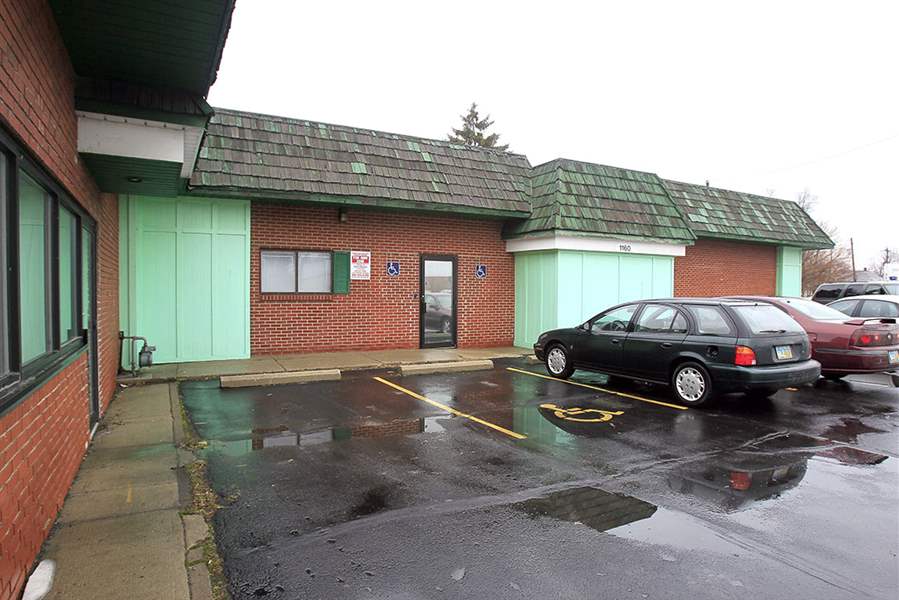
Records show Toledo abortion clinic faces $40K fine
9/11/2017
The Capital Care Clinic at 1160 West Sylvania Avenue in Toledo, Ohio on January 11, 2014.
THE BLADE/JETTA FRASER
Buy This Image
COLUMBUS — Northwest Ohio’s last abortion clinic faces a potential $40,000 fine by the Ohio Department of Health as the clinic prepares to defend its operating license Tuesday before the state Supreme Court.
State health Director Lance D. Himes notified Terrie Hubbard, administrator of the Capital Care Network clinic in West Toledo, of the proposed fine in a letter dated Aug. 21. This stems from alleged policy violations it said it found during a licensure inspection of the facility on April 11.
On Tuesday, the state’s highest court will hear the department’s appeal of lower court rulings barring it from shutting the facility down on the grounds that it lacks a valid written transfer agreement with a local hospital to care for patients in the event of medical emergencies.
The clinic has already requested a formal hearing to challenge the inspection’s findings and proposed fine, denying that there were any violations of its internal procedures.
“It turns out there was no complication,” said the clinic’s Cincinnati attorney, Jennifer Branch. “It was just precautionary.”
The clinic is accused of failing to follow its own internal procedures when it came to the transfer of a patient to Toledo Hospital for an ultrasound after suspected complications following an abortion.
The patient was driven to the hospital by a clinic staff member.
The inspection report, obtained by Ohio Right to Life through a public records request, said the staff member did not stay with the patient throughout the process and the patient was not accompanied by proper medical records and discharge documentation in violation of the clinic’s own policies.
The findings also said the board failed to follow up on the incident with a quality control review by its governing board.
“Capital Care Network yet again was caught breaking Ohio’s health and safety regulations,” said Ohio Right to Life President Michael Gonidakis. “The health department investigation revealed that a woman’s life was in danger and she needed medical care, yet Capital Care couldn’t be bothered to even call 911 and ensure that the woman received real care.”
The patient in question was one of three cases inspected by the department during its surprise April 11 inspection, and Ms. Branch said the inspector specifically requested her file. The incident occurred 10 days before the inspection.
The patient was 11.5 weeks pregnant when the abortion was performed. A follow-up ultrasound suggested the patient had retained some placenta and fetal tissue, and the physician noted “possible perforation of bowel in cavity.”
The clinic did not call 911. According to the inspection report, the patient advocate who drove the patient to the hospital said, “I guess the Doctor didn’t feel it was that much an emergency.”
Ms. Branch said the patient returned to the clinic several days later to assure it she was fine. She had been observed at the hospital and released. She said the incident was not a medical emergency that would have triggered the transfer agreement that is the subject of Tuesday’s arguments before the Supreme Court.
“The timing of the inspection report and fine are suspicious,” she said. “This came out last week. ODH inspected back in April and never said anything to the clinic that there was a problem or a violation of any rules.”
According to the clinic’s response to the state’s findings, the clinic began its own review prior to the state’s inspection. It stated that since the transfer was not due to an emergency, it had not violated its emergency transfer policy.
However, it said it has developed a new non-emergency patient transfer policy on which it will train staff. The new policy outlines how staff would go about arranging transportation in non-emergency cases, including calling an ambulance, but it specfieis that staff members will not drive the patients themselves.
State law requires ambulatory surgical facilities, including abortion clinics, to have in place agreements with “local” hospitals to accept patients in case of emergency complications. In court documents, the clinic has claimed it has never had to make such a transfer.
The clinic obtained such an agreement with the University of Michigan Health Center in Ann Arbor, but the state rejected the idea that a hospital more than 50 miles away could be considered “local.” Since then, lawmakers have changed state law to define “local” as being within 30 miles.
Lucas County Common Pleas Court and the Sixth District Court of Appeals have both sided with the clinic against the department’s order that the clinic close. That has led to the state’s appeal Tuesday before the Supreme Court.
The clinic performed 895 abortions in 2016.
Contact Jim Provance at jprovance@theblade.com or 614-221-0496.